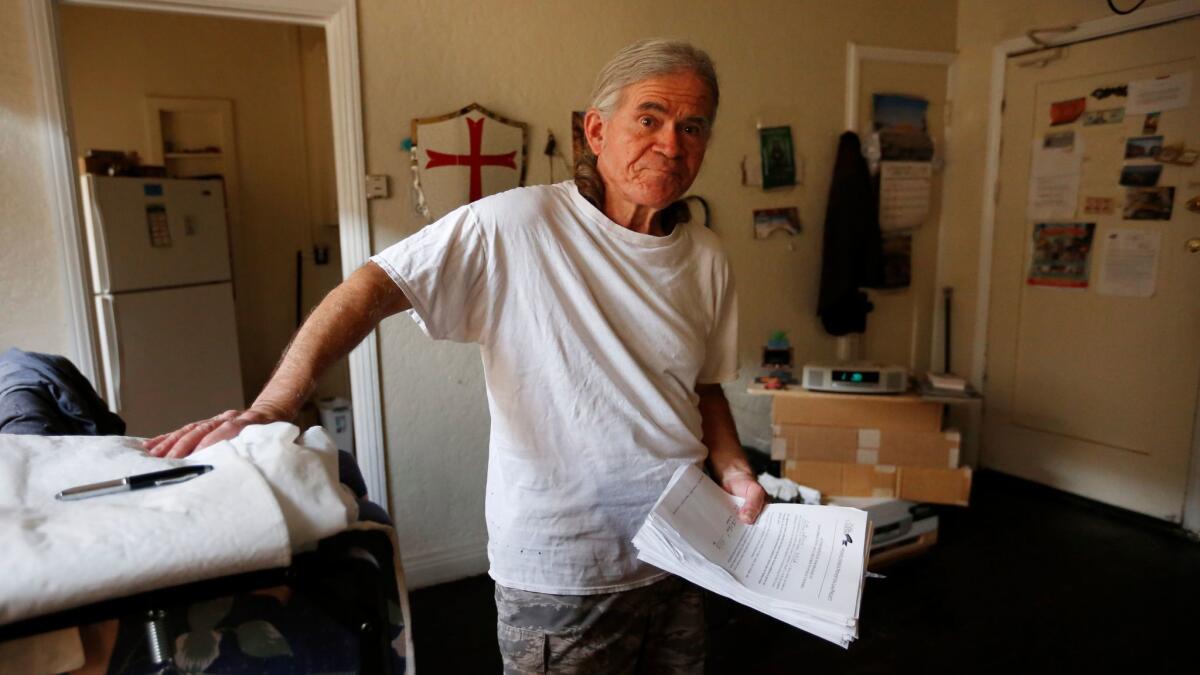Investment firm ousts mentally ill and Latino families to flip Koreatown buildings, lawsuit alleges

After a lifetime of riding the trains in the summer and wintering at the missions on L.A.’s skid row, Arthur Rivera ended up in a Santa Monica gutter.
Then a case manager with Step Up on Second, a mental health services agency, obtained a rental subsidy for him. In 2011 Rivera moved into a single apartment in a four-story, brick-facade building in Koreatown.
Rivera, 67, said his life has stabilized into a simple routine, riding the bus several times a week to Step Up on Second for group activities and meals. Otherwise, he stays in his sparse apartment where the furnishings consist of a metal fold-up bed and a box for his radio.
“I stay home and listen to my music,” Rivera said. “I do my exercise. Taking my shower. Inside my room. I get discouraged going outside. Going outside I get angry and nervous. I feel better staying in here. I want to at least have my space.”
But Rivera’s equilibrium was upended three years later when the building was sold.
The new manager told him, “’There’s going to be some big changes around here,’” he said.
According to a lawsuit filed in federal court Thursday, the changes began with a notice from the new owner that it would no longer accept Section 8. Rivera was given 90 days to move.
Rivera is one of 15 tenants in five Koreatown buildings named as plaintiffs in the lawsuit, filed electronically Thursday night by the pro bono law firm Public Counsel and the nonprofit law firm Public Advocates Inc. It alleges that the Century City investment company Optimus Properties LLC used abusive and discriminatory tactics to displace mentally ill and Latino tenants from the rent-controlled buildings so they could renovate their units and rent them for more money.
In addition to Optimus, the lawsuit names five affiliated limited liability companies that are the registered owners of the buildings; Roxbury Ventures LLC, described as Optimus’ property management company; and Jerome Mickelson, listed on Optimus’ website as director of construction/multifamily asset manager.
On Friday, Mickelson emailed The Times a statement on behalf of Optimus denying the allegations.
“We take these allegations very seriously and categorically deny each and every such allegation,” the email said. “The Plaintiff in this action never contacted us to investigate these claims and has filed this action without proper analysis and investigation. We look forward to working with the Plaintiff to educate them about the real facts and if need be, to exonerate ourselves at trial. Our tenants are the key to our success and are treated with respect at all stages of their tenancy.”
He declined to answer questions.
The lawsuit alleges Optimus violated state and federal anti-discrimination laws to push out “undesirable” tenants so it could “market the units to childless, English-speaking, non-disabled people of means, and increase their profits on the rapid resale of the apartment buildings.”
The 92-page complaint contains a section on each of the 15 plaintiffs, outlining instances of rent increases and eviction notices that it described as unlawful. Four of the plaintiffs were described as people with mental disabilities. The others were Spanish-speaking tenants, either couples with children, single parents or elderly.
Deepika Sharma, the lead attorney for the plaintiffs, said a case manager for one of the clients brought Public Counsel a copy of the Section 8 termination notice. Public Counsel notified Optimus that the notice was illegal because local law prohibits termination of tenancy without legal cause to evict, Sharma said.
The lawsuit alleges explicit discrimination by representatives for the defendants who “have said, in so many words, that ‘regular tenants’ should not have to live near tenants with mental disabilities with their ‘symptoms’ and ‘issues’; that they will call immigration on Latino tenants who challenged eviction notices; that the smells of Latino cooking are ‘disgusting’ and ‘foul’; and that families whose children use common areas will be evicted.”
Three pages on Rivera say the notice of his Section 8 termination was the beginning of a litany of notices that caused “multiple threats to his ability to remain in his home, which he was able to stave off only through the assistance of Step Up and pro bono counsel...”
Besides the Section 8 termination notice, which the law firm successfully fought, Rivera received four eviction notices based on a rent increase that the lawsuit alleged was illegal because it was not approved, as required by law, through the Los Angeles Housing Authority. A fifth eviction notice alleged Rivera was violating his lease by playing music too loud.
The lawsuit also says that Optimus failed to comply with three letters sent by Rivera’s caseworker and Public Counsel asking that all communications be sent to them as a “reasonable accommodation” for his disability.
“Rivera has experienced “significant emotional distress, including anxiety, fear, and loss of sleep,” the lawsuit alleges. “Step Up has had to divert significant time, effort, and expense to helping Rivera combat Defendants’ unlawful notices and other discriminatory practices.”
The lawsuit seeks compensatory and punitive damages and an injunction ordering Optimus to cease the alleged practices.
Twitter: @LATDoug
ALSO
Exide cleanup: State testing more schools, parks and day-care centers for lead danger
Missing Los Angeles couple drank their own urine while lost in the desert
More to Read
Sign up for Essential California
The most important California stories and recommendations in your inbox every morning.
You may occasionally receive promotional content from the Los Angeles Times.











